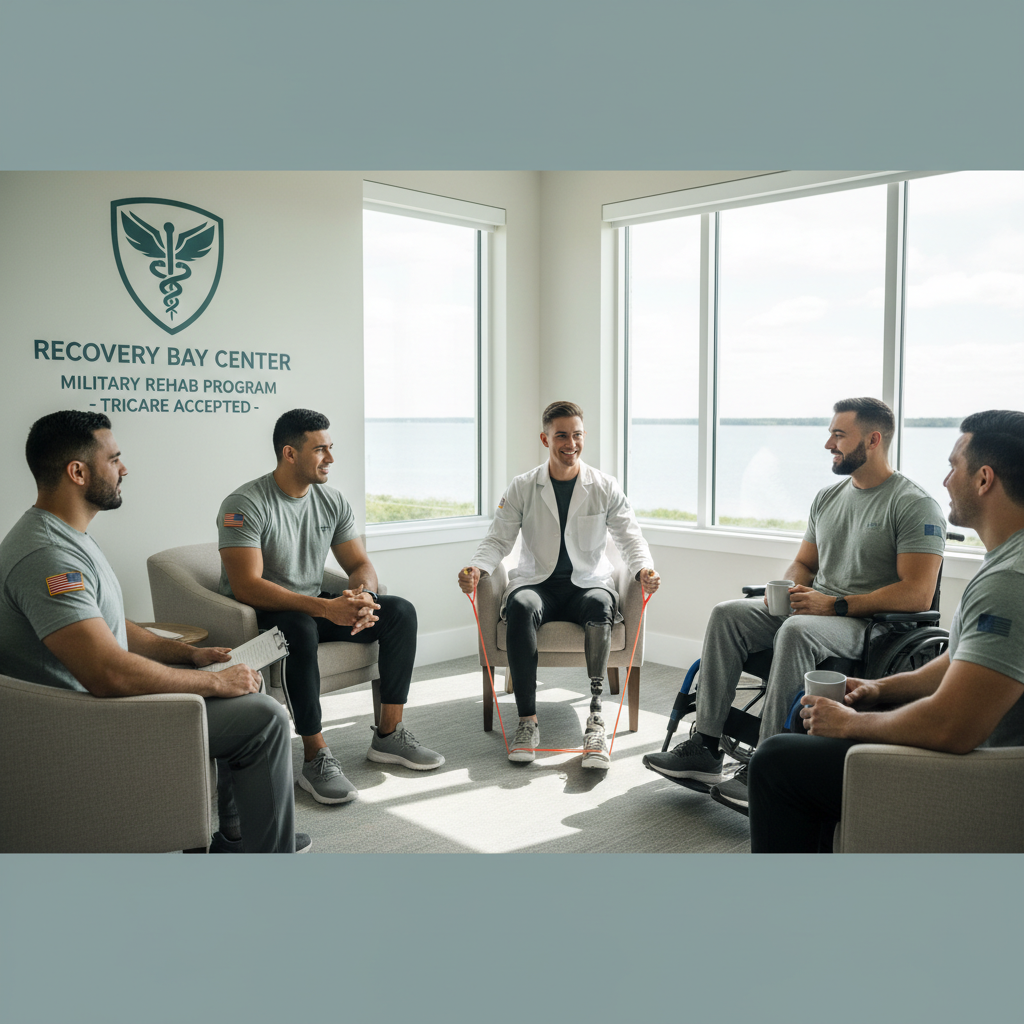Understanding Blue Cross Blue Shield Coverage
Navigating the details of Blue Cross Blue Shield (BCBS) coverage for men’s residential drug rehab can be complex. Here, we break down the specifics to help you understand the different aspects of your coverage options for addiction treatment.
Coverage Details by State
Blue Cross Blue Shield provides coverage across various states, but the specifics can vary depending on local policies and the particular plan. For instance, Ohio has a significant network of addiction treatment centers accepting BCBS insurance. The Ohio Addiction Recovery Center offers in-network services and covers up to 100% of the treatment cost (Ohio Addiction Recovery Center). Additionally, there are 89 centers in Ohio where BCBS insurance is accepted for addiction and mental health treatment (Recovery.com).
| State | Number of Centers | Coverage Percentage |
|---|---|---|
| Ohio | 89 | Up to 100% |
| California | 75 | Varies |
| Florida | 65 | Varies |
| Texas | 80 | Varies |
Inpatient vs. Outpatient Coverage
Blue Cross Blue Shield offers various forms of treatment coverage, including both inpatient and outpatient programs.
Inpatient Coverage: BCBS covers different types of inpatient rehab, providing specialized programs designed to address substance use disorders and co-occurring mental health conditions. Among the benefits provided are detoxification services, medication-assisted treatment, and comprehensive 24/7 support (American Addiction Centers). This ensures that individuals receive round-the-clock care in a controlled environment, which is often crucial for more severe addiction cases.
Outpatient Coverage: BCBS also provides coverage for outpatient programs, which are effective for treating substance abuse and co-occurring disorders. Outpatient treatment allows individuals to maintain their daily activities while receiving specialized care. This type of program is beneficial for those who require a flexible treatment schedule (American Addiction Centers).
| Program Type | Coverage Details |
|---|---|
| Inpatient Rehab | Covers detox services, medication-assisted treatment, behavioral health services, and 24/7 support |
| Outpatient Rehab | Covers substance use treatment with flexible scheduling |
To maximize your understanding of BCBS coverage for men’s residential rehab, we recommend contacting BCBS directly for more precise information regarding the specifics of your plan and verifying which facilities are considered in-network. For more information on addiction treatment options for men, see our articles on mens drug rehab covered by blue cross blue shield and bcbs in-network drug and alcohol treatment for men.
Benefits of Men-Only Rehab Programs
Tailored Approach for Men
A men-only rehab program provides a tailored approach that addresses the unique needs and challenges faced by men during their recovery journey. By creating a gender-specific environment, these programs allow for a more focused and effective treatment experience. Men often face different societal pressures and expectations that can impact their substance use and recovery process.
In a men-only rehab, the treatment plans are designed to address issues that men commonly encounter, including stress from career pressures, familial responsibilities, and societal expectations. These programs incorporate therapeutic strategies and group activities that resonate more deeply with men, ensuring a comprehensive and individualized approach to healing.
Focus on Male-Specific Issues
Men-only rehab programs focus on male-specific issues, offering an environment where men can openly discuss and address challenges unique to their gender. This focus includes addressing mental health concerns like depression and anxiety, which are often experienced differently by men. Additionally, these programs emphasize building healthy relationships and improving communication, which are crucial components in a man’s recovery process.
The rehab process typically involves a combination of individual therapy sessions to explore personal issues and group therapy sessions that foster camaraderie and peer support. In group settings, men can share their experiences and struggles without the feeling of judgment, leading to a more supportive and understanding atmosphere.
For those interested in the insurance aspect, Blue Cross Blue Shield often covers outpatient programs for substance abuse treatment (American Addiction Centers). It’s important to verify specific coverage details with BCBS to understand potential out-of-pocket expenses. The company also supports a significant number of addiction and mental health treatment centers across various states.
For more information on insurance coverage, check out our articles on mens drug rehab covered by Blue Cross Blue Shield and mens residential addiction treatment covered by Cigna.
Qualifying for Men’s Residential Rehab
Finding the right mens residential drug rehab Blue Cross Blue Shield includes understanding coverage and verifying insurance. This section delves into the steps of verification and the eligibility criteria for men-only rehab programs.
Insurance Verification Process
The first step in accessing mens inpatient program in-network with Blue Cross Blue Shield is the insurance verification process. This pivotal step confirms whether the specific rehab services, including specialized programs for substance abuse and co-occurring disorders, are covered by your policy.
Typically, Blue Cross Blue Shield covers various forms of inpatient rehab, such as medical detoxification, residential treatment, and intensive inpatient care. To verify your insurance, follow these steps:
Contact Your Insurance Provider: Reach out to Blue Cross Blue Shield customer service. Provide them with necessary details, such as your policy number and the specifics of the rehab services you are seeking.
Talk to the Rehab Facility: Facilities like Evoke Wellness in Ohio accept Blue Cross Blue Shield for rehab services, easing the insurance verification process and providing clarity on coverage (Evoke Wellness).
Submit Required Documentation: Share documents like an insurance card and any required medical history forms to streamline the verification process. This helps both your insurance provider and the rehab center to assess the coverage and your needs effectively.
Here is an overview of what typically gets covered:
| Service Type | Coverage Details |
|---|---|
| Inpatient Rehab | Covered |
| Medical Detox | Covered |
| Residential Treatment | Covered |
| Intensive Inpatient Care | Covered |
| Behavioral Health Services | Included |
Eligibility Criteria Overview
Understanding the eligibility criteria is crucial to ensuring that you or your loved ones are qualified for the men’s residential rehab program. Blue Cross Blue Shield usually requires the following:
Diagnosis of Substance Use Disorder: A formal diagnosis from a licensed healthcare professional ensures that the patient qualifies for addiction treatment. This can encompass various substance use disorders, including alcohol and drug dependency.
Pre-Authorization: Some policies require pre-authorization before admission to rehab. Pre-authorization is obtained by providing a treatment plan that outlines the medical necessity for rehab (Ohio Addiction Recovery Center).
Referral from a Healthcare Provider: A referral from a primary care physician or a mental health professional might be needed to validate the necessity of residential rehab.
Network Provider Requirements: Confirm if the chosen rehab center is within the Blue Cross Blue Shield network. In-network providers usually result in fewer out-of-pocket expenses. Facilities like Recovery.com accept most private insurance policies, making treatment more accessible and affordable.
Below is an example table summarizing typical expenses you might still need to cover, even with insurance:
| Expense Type | Description |
|---|---|
| Co-Pay | A fixed amount paid per service |
| Deductible | The amount you pay before insurance covers the rest |
| Co-Insurance | A percentage of costs you pay after your deductible is met |
By understanding and navigating the insurance verification process and eligibility criteria, you can streamline the path to qualifying for a men’s residential rehab program covered by Blue Cross Blue Shield. For more information on other insurers, visit mens alcohol rehab covered by Cigna or residential rehab for men that accepts Tricare.
For further support in finding a suitable program, consider exploring other resources such as Blue Cross Blue Shield in-network men’s detox and BCBS covered residential alcohol rehab for men.
The Journey of Recovery
When seeking mens residential drug rehab with Blue Cross Blue Shield coverage, understanding the recovery journey can provide clarity and assurance. Recovery typically involves medical detoxification and inpatient rehabilitation programs, both essential steps for a successful outcome.
Medical Detoxification
Medical detoxification is the first step in the recovery process, focusing on safely managing withdrawal symptoms as your body clears itself of substances. Blue Cross Blue Shield generally covers medical detox as part of its addiction treatment benefits, ensuring financial support for intensive detox programs (Evoke Wellness). Detox is crucial for several reasons:
- It provides a medically supervised environment, reducing the risk of complications.
- It helps to alleviate withdrawal symptoms, making the process more comfortable.
- It prepares you for the subsequent stages of treatment.
Here is a summary of detox coverage:
| Substance | Coverage Details |
|---|---|
| Alcohol | Typically covered |
| Opiates | Generally covered |
| Benzodiazepines | Often covered |
Consult with your mens inpatient rehab covered by Ambetter insurance facility to understand the specifics of your Blue Cross Blue Shield policy.
Inpatient Rehabilitation Programs
Following detox, inpatient rehabilitation programs provide a structured environment for comprehensive addiction treatment. Blue Cross Blue Shield covers various forms of inpatient rehab, including specialized programs for substance abuse and co-occurring disorders (American Addiction Centers). With Blue Cross Blue Shield, you can expect:
- 24/7 Medical Support: Continuous care from medical professionals.
- Tailored Treatment Plans: Programs designed to address your unique needs.
- Focused Therapy: Both individual and group therapy sessions to foster recovery.
For a deeper understanding of the benefits of inpatient treatment, visit mens inpatient program in-network with BCBS.
Coverage can vary depending on the state and specific Blue Cross Blue Shield plan. It’s essential to verify your insurance benefits to determine the extent of your coverage for mens alcohol treatment center in-network with Cigna.
Here are typical features of inpatient programs:
| Feature | Description |
|---|---|
| Length of Stay | Typically 30-90 days |
| Therapies Offered | Individual, Group, Family |
| Additional Support | Dual Diagnosis, Relapse Prevention |
Recovery is a journey that requires the right support and care. Blue Cross Blue Shield is committed to covering services that aid in your transformation. Ensure you understand your Blue Cross Blue Shield in-network mens detox options to make informed decisions on your path to sobriety.
The Role of Therapy and Support
Therapy and support play a vital role in men’s residential drug rehab covered by Blue Cross Blue Shield. Focusing on individual therapy sessions and group therapy benefits can make a significant difference in the journey to recovery.
Individual Therapy Sessions
Individual therapy sessions involve one-on-one meetings between the patient and a licensed therapist. These sessions allow individuals to explore personal issues, emotional triggers, and underlying causes of substance abuse. Blue Cross Blue Shield covers individual therapy sessions for substance abuse and mental health conditions, though coverage may vary by plan.
Benefits of individual therapy sessions include:
- Personalized Attention: Patients receive undivided attention from their therapist, enabling a deeper understanding of their unique challenges.
- Confidentiality: Private sessions ensure a safe space for patients to discuss sensitive issues without fear of judgment.
- Customized Treatment Plans: Therapists can tailor treatment strategies to address specific needs and goals.
For more information on how individual therapy can help in substance abuse recovery, visit our page on individual therapy sessions.
Group Therapy Benefits
Group therapy sessions involve multiple participants led by a therapist. This setting fosters a sense of community and shared understanding among individuals facing similar struggles. Blue Cross Blue Shield often covers group therapy as part of its mental health and substance abuse treatment plans.
Benefits of group therapy include:
- Peer Support: Sharing experiences with others who are on similar journeys can provide emotional support and reduce feelings of isolation.
- Skill Building: Participants learn coping strategies, communication skills, and problem-solving techniques from both the therapist and peers.
- Accountability: Group settings encourage accountability and motivation by fostering a collective commitment to recovery.
Key features of group therapy:
| Feature | Description |
|---|---|
| Session Size | Typically 6-12 participants, ensuring active involvement |
| Duration | Sessions last 60-90 minutes |
| Frequency | Often held multiple times per week |
For additional resources on group therapy and other support systems, explore our article on tips for straightening curly hair.
Understanding the role of therapy and support is essential in navigating the journey of addiction recovery. By leveraging individual and group therapy sessions, men can overcome substance dependence more effectively and sustainably. To learn how Blue Cross Blue Shield supports these crucial aspects of rehab, visit mens inpatient rehab covered by ambetter insurance and mens addiction treatment covered by bcbs insurance.
Aftercare Planning and Support
Successfully overcoming substance use in a mens residential drug rehab covered by Blue Cross Blue Shield is commendable and significant. Sustaining sobriety post-treatment requires robust aftercare planning and continuous support. Aftercare services and support resources are vital components in preventing relapse and ensuring long-term recovery.
Transitional Care Services
Transitional care services bridge the gap between residential rehab and returning to daily life. These services offer structured and supportive environments where individuals can gradually adjust to their regular routines. Blue Cross Blue Shield typically covers outpatient programs (American Addiction Centers), which can be an important part of this transition.
- Sober Living Homes: These residences provide a stable environment for men, encouraging accountability and a sense of community. Residents support each other while adhering to the guidelines of sobriety.
- Outpatient Programs: After completing inpatient rehab, individuals may continue their recovery in an outpatient setting, allowing them to attend therapy sessions while resuming their daily activities.
- Follow-Up Medical Care: Regular medical check-ups ensure any lingering health issues are addressed promptly, supporting overall well-being.
Ongoing Support Resources
Having access to continuous support resources significantly enhances the likelihood of maintaining sobriety. Blue Cross Blue Shield plans often cover individual and group therapy sessions for substance abuse and co-occurring mental health conditions (American Addiction Centers).
- Individual Therapy Sessions: One-on-one therapy provides a safe space for men to explore personal challenges and receive tailored strategies for coping. For more information on covered services, visit bcbs approved detox for men.
- Group Therapy Benefits: Engaging in group therapy allows men to share experiences and support peers facing similar challenges. Group therapy can be instrumental in building a network of sober support.
- Support Groups: Participating in support groups like Alcoholics Anonymous (AA) or Narcotics Anonymous (NA) offers ongoing encouragement and accountability. These groups are often pivotal in sustaining long-term recovery.
- Therapy and Medication Management: Combined with therapy, medication-assisted treatment may be necessary for some. BlueCross BlueShield frequently covers these integrated approaches.
Ongoing support is available through various inpatient rehab services accepted by Blue Cross Blue Shield, ensuring that you or your loved one have the necessary resources to navigate the path to long-lasting recovery.
Utilizing these transitional care services and ongoing support resources effectively can empower men to maintain their sobriety and foster a healthy, fulfilling life post-rehabilitation. For more personalized advice and planning, explore our detailed guide on mens inpatient substance use treatment with bcbs.





